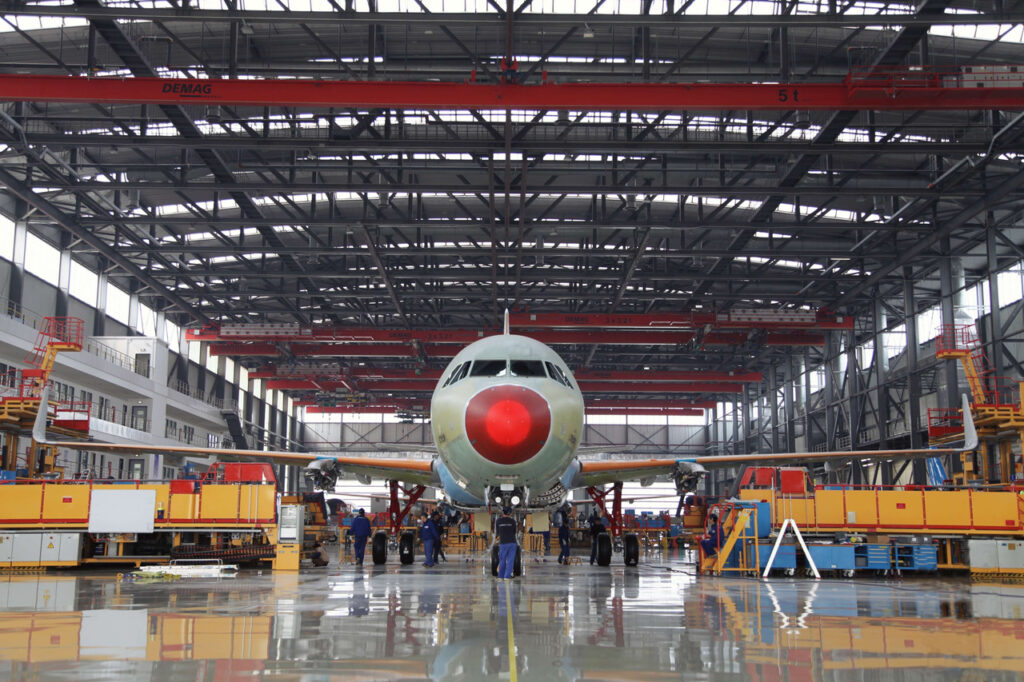Aircraft manufacturer Airbus has signed significant new cooperation agreements with China aviation industry partners during the French state visit to China.
The main agreement will effectively expand A320 Family final assembly capacity with a second line at its Tianjin site. This will represent a significant contribution to Airbus’ overall rate objective of 75 aircraft per month in 2026 throughout its global production network.
The agreement was signed with the Tianjin Free Trade Zone Investment Company Ltd., and Aviation Industry Corporation of China Ltd. Present to witness the event were Chinese President Xi Jinping and French President Emmanuel Macron, Airbus CEO, Guillaume Faury.
Airbus assembly sites
Currently, Airbus has four A320 Family final assembly sites worldwide: Hamburg (Germany), Toulouse (France), Mobile (USA) and Tianjin (China).
The Tianjin Final Assembly Line (FAL Asia) first started operation in 2008 and has assembled over 600 A320 Family aircraft to date.
In March 2023 the first A321neo aircraft was delivered from the line, marking a new era of enhanced A320 Family production versatility.

Further agreements
As an additional agreement, Airbus also signed General Terms of Agreement (GTA) with the China Aviation Supplies Holding Company (CAS) covering the purchase of 160 Airbus commercial aircraft.
The GTA comprises earlier announcements for 150 A320 Family aircraft and for 10 A350-900 widebody aircraft orders, reflecting the strong demand in all market segments by Chinese carriers.
Over the next 20 years, China’s air traffic is forecast to grow at 5.3% annually, significantly faster than the world average of 3.6%.
This will lead to a demand for 8,420 passenger and freighter aircraft between now and 2041, representing more than 20 percent of the world’s total demand for around 39,500 new aircraft in the next 20 years.
SAF and sustainability
Airbus and the China National Aviation Fuel Group (CNAF) also signed a Memorandum of Understanding (MoU) to intensify Chinese-European cooperation on the production, competitive application and common standards formulation for Sustainable Aviation Fuels (SAF).
Last year, in September 2022, Airbus and CNAF contracted to support commercial and delivery flights in China to be operated with SAF.
By the end of March, 17 delivery flights and a first commercial flight were facilitated by the two partners.
This new cooperation agreement aims at optimising the SAF supply chain by diversifying the sources and enhancing SAF production towards the ambition of using 10 percent SAF by 2030.
“We are honoured to continue our long-standing cooperation by supporting China’s civil aviation growth with our leading families of aircraft.”
“It underpins the positive recovery momentum and prosperous outlook for the Chinese aviation market and the desire to grow sustainably with Airbus’ latest generation, eco-efficient aircraft,” said Airbus CEO Guillaume Faury.
“Airbus values its partnership with the Chinese aviation stakeholders and we feel privileged to remain a partner of choice in shaping the future of civil aviation in China.”
Airbus and the Chinese market
Airbus has been doing business in China for almost 40 years and has a strong presence in the country. China is one of the world’s largest aviation markets and is expected to become the world’s largest domestic air travel market by 2024.
As such, China remains a key market for Airbus commercial aircraft.
Airbus entered the Chinese market in 1985, when an A310 was first delivered to China Eastern Airlines. By the end of the first quarter 2023, the Airbus in service fleet in China has risen to over 2,100 aircraft, representing more than 50 percent of the market.
Airbus previously forecasted that China would require over 8,600 new aircraft over the next 20 years, representing nearly 20% of the world’s total demand for new aircraft during that period.
This highlights the significant growth potential for Airbus in China and underscores the importance of the Chinese market for the company.









